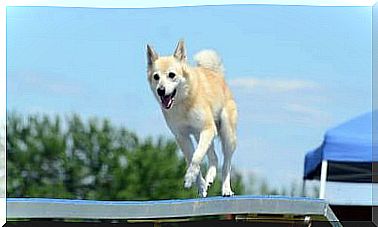How To Tell If Your Dog Has Alzheimer’s

Although it is normal for dogs, just like people, to lose some faculties as they age, if a dog suffers from Alzheimer’s, it will show a series of signs that must be detected early, in order to reduce and become more slow deterioration.
Cognitive dysfunction syndrome, or canine Alzheimer’s, is a neurodegenerative disorder with disease-like features that affects humans. It is associated with age and causes a gradual decrease in the animal’s brain functions.
Aging and cognitive dysfunction in dogs

Although not all dogs start the development process at the same age, it is considered that dogs start old age – on average – from the age of seven.
The normal aging process of these animals usually includes:
- Vision and hearing loss;
- Decrease in energy;
- Increased sleep hours;
- Difficulties in walking.
Also, animals tend to become more grumpy and less patient, and spend more time alone and calm.
In addition, more than half of dogs over the age of 15 can develop canine Alzheimer’s.
Learning to recognize early signs associated with cognitive dysfunction syndrome will help dogs enjoy a higher quality of life during old age.
Signs that a Dog Suffers from Canine Alzheimer’s
A dog suffering from cognitive dysfunction syndrome exhibits a series of behavioral changes due to the degenerative process of its central nervous system.
In the same way as humans, the dog presents:
- Memory loss;
- Disorientation;
- Psychological changes;
- Confusion and personality changes.
To detect whether a dog has Alzheimer’s , you will need to pay attention to the following signs:
- Does not respond when called;
- Disoriented, even inside the house;
- Does not recognize family members;
- It fails to ask for affection and does not seek to attract the attention of its owners;
- Lose the desire to play;
- It always seems distant, looking at nothing;
- It has repetitive attitudes : it walks around the same place, wanders aimlessly, displaces objects;
- It gets stuck between the furniture without being able to get out;
- Modify your sleep routine: sleep more and generally during the day;
- During the nights, he may walk and bark for no apparent reason;
- He needs out of the usual places, even losing control of the sphincters.
Canine Alzheimer’s: Early diagnosis is critical
When some of the signs related to cognitive dysfunction syndrome appear, it is important to consult an urgent veterinarian to confirm the diagnosis and provide the animal with treatment that delays deterioration.
There are professionals specialized in veterinary neurology and geriatrics who can indicate the best steps to be taken to ensure a better quality of life for elderly dogs with Alzheimer’s.
How to help a dog with cognitive deterioration

Author: Soggydan Benenovitch
Although old age and canine Alzheimer’s cannot be reversed, it is possible to make these diseases progress more slowly. For example:
- Providing the dog with adequate food;
- Encouraging the learning of new behaviors aimed at a routine in which the dog feels calm and safe;
- Stimulating your mind with games and different activities;
- Interacting with the animal constantly: talking to it, petting it, and making it feel wanted;
- Keeping the tours and taking you to new places;
- Putting on music to relax you and reduce your anxiety levels.
The best treatment is love
In view of the advancement of symptoms, the veterinarian may also recommend:
- Palliative drugs, especially those that improve blood flow;
- Antioxidants and Vitamin E;
- Conduct modification therapies.
Anyway, the best thing that can be done in these cases is to show your pet all the love you feel for him.
It is known that some dogs are used as therapy animals to help elderly people with Alzheimer’s and they achieve very positive results with these people.
So, one way to return to animals all the good they provide us, is to accompany them and take care of them during the deterioration that old age entails.
And even though they can no longer show their affection for their owners in such an overt or effusive way, we should have no doubts how much they love us.









